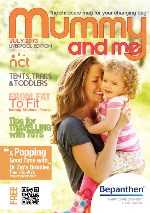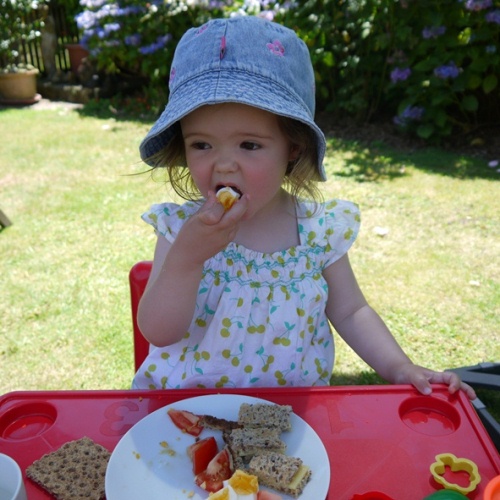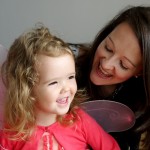Tag: nutrition
Explore, Educate and Eat
Food education is at the forefront of most parents’ minds and is fast becoming a core subject on the school curriculum. I am not surprised there is so much focus on teaching nutrition to children from a young age. Children who learn about food and nutrition are more likely to make healthy food choices and eat fruit and vegetables.
The best and most simple way to get your children thinking about food and nutrition is to get them involved. Here are some simple, daily activities you can do with your children to expand their knowledge about food and make learning fun.
Start with fruit and vegetables
Buy a selection of both and play simple question and answer games that your children will find interesting and educational. What is it? How is it grown? Where does it come from? Could you grow it in your garden or on an allotment?

Experiment
During the week sit down and eat each fruit and vegetable with your children. Talk about whether you can eat it fresh or if it needs to be cooked first. What does it taste like? What colour is it? Ask your children to come up with as many meal ideas as they can that include this fruit or vegetable.
Go green
An easy and engaging project is to try growing fruit, vegetables and herbs with your children. Even if you’re not green fingered, give it a go! All children love to be outside and will learn from the experience of growing something they can eat, plus you could save money growing your own.
Visit a Farmer’s Market
Have a family day out and let your children discover where food comes from and how it is grown. Talk to the growers about their produce and sample the fresh food on offer.
Create
Involve your children in the preparation of their lunch box using fresh ingredients. Cook simple meals and get your children to help where they can, even if they’re simply watching you and talking about what you’re doing. Sit down as a family and enjoy your home cooked food together.
Explore nutrition
Teach your children about the importance of nutrition for a healthy mind and body. Explain why fresh is best.
If you follow these simple steps your children will soon start to take a keen interest in fresh foods and helping you to prepare and cook meals. Regular interaction with food as part of your everyday home life will encourage children to make the right choices for their health.
 Lydia Oliver – Nutritional Advisor Only Best For Baby
Lydia Oliver – Nutritional Advisor Only Best For Baby
This article was published in the August 2013 edition of Mummy and Me Magazine.
I offer one to one nutrition programmes for breastfeeding, post pregnancy weight loss, weaning, weight management and health. Contact me.
National Childhood Obesity Awareness Week
The first week of July is National Childhood Obesity Awareness Week. It is a time when leading organisations aim to highlight the impacts of childhood obesity and request the Government take action to focus on reducing obesity in children, for the health of our nation.
Awareness of childhood obesity and the risks it brings can help parents make better choices for their children. There is a much greater chance that overweight children will become overweight adults, when compared to children who maintain a normal weight throughout adolescence.
Childhood obesity heightens the risk of serious illnesses during childhood and increases the risk of developing long-term health conditions such as type 2 diabetes, heart disease, stroke and several types of cancer.

As a parent there is plenty that you can do to help your child maintain a healthy weight with the support of healthcare professionals and schools. Many teaching institutions now provide an environment where your child can learn about nutrition and health.
Healthy living starts at home and children learn first and foremost from their parents.
Here are some easy ways to assist your child to achieve a healthy weight:
1. Monitor your child’s weight. The ‘red book’ you are given when your baby is born contains useful charts for reviewing your child’s weight, height and development. Always seek professional help if you are concerned about any aspect of your child’s health and development.
2. Encourage your child to exercise and have fun outdoors every day.
3. Feed your child a healthy diet high in vegetables, fruit and unprocessed foods. Minimise the amount of packaged food, fresh is best.
4. Enjoy food in moderation and limit sweet treats to special occasions.
5. Have fun teaching your child about nutritious foods and show them how to cook healthy meals so they are prepared to make the best choices in life.
6. Be a role model for your child and encourage physical activity and healthy eating.
If your child is overweight, you can do something about it. The earlier you act the sooner your child will reap the health benefits, both mentally and physically.
 Lydia Oliver – Nutritional Advisor Only Best For Baby
Lydia Oliver – Nutritional Advisor Only Best For Baby
This article was published in the July 2013 edition of Mummy and Me Magazine.
I offer one to one nutrition programmes for breastfeeding, post pregnancy weight loss, weaning, weight management and health. Contact me.
You Are What You Eat
The range of baby food available in my local supermarket is vast. You can buy everything from baby porridge to pasta to purees to toddler meals to rusks and every imaginable snack in between.
There is a greater choice of baby food available now than there was a few decades ago, with many brands producing organic baby purees and toddler meals. Despite this growth in the selection of baby food, it is still better for your baby to eat fresh homemade purees and meals.
As tempting as it can be to buy ready made baby food, it is important to be aware that some baby food contains artificial additives, salt and sugar. These added ingredients are unnecessary and are of no nutritional benefit to your baby. Sugar can lead to your baby developing a habit for sweet tasting foods as well as increasing the risk of tooth decay. Salt places strain on your baby’s immature kidneys and can lead to dehydration.

When you make your own baby food you know exactly what is being eaten by your baby. You can guarantee the freshness of the ingredients and you know the amount of each food type that has gone in to your baby’s puree or meal. As well as being a healthier option for your baby, it is also more cost effective to make your own and will save you and your family money.
I always think of the importance of what my baby is eating for her health and wellbeing. A healthy diet from the outset will give your baby the best start in life. Fresh, natural food is full of nutrients that provide us with nourishment and energy. These nutrients assist us to grow, aid in the repair of cells and help to fight off disease.
Developing your baby’s tastes and their enjoyment of the natural texture of food is vital for when baby is ready to eat family meals.
It takes less than 15 minutes a day to make a healthy meal that will give you and your family vital nutrients to keep you healthy. As a healthy and cheaper alternative to buying ready made baby food and to save time, I often make more than enough for one meal and save a portion for the following day. Another easy way to have fresh homemade baby meals available is to freeze small portions of puree or a freshly made family meal. These can then be defrosted and served when you need a meal for your baby that is quick and nutritious.
Experiment with new recipes and enjoy cooking for you and your family. Good nutrition is one of the key building blocks to your child’s development, growth and health.
 Lydia Oliver – Nutritional Advisor Only Best For Baby
Lydia Oliver – Nutritional Advisor Only Best For Baby
This article was published in the June 2013 edition of Mummy and Me Magazine.
I offer one to one nutrition programmes for breastfeeding, post pregnancy weight loss, weaning, weight management and health. Contact me.




